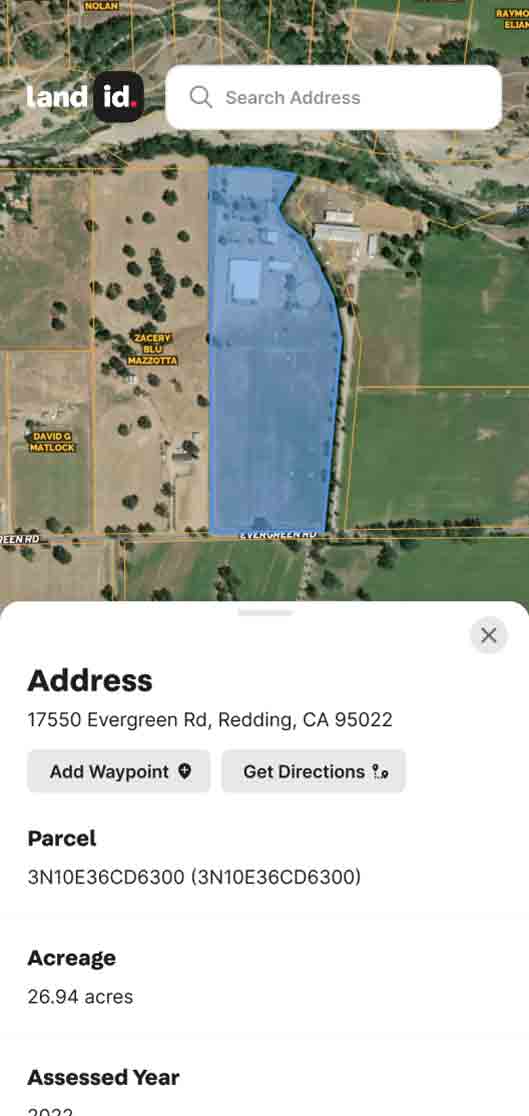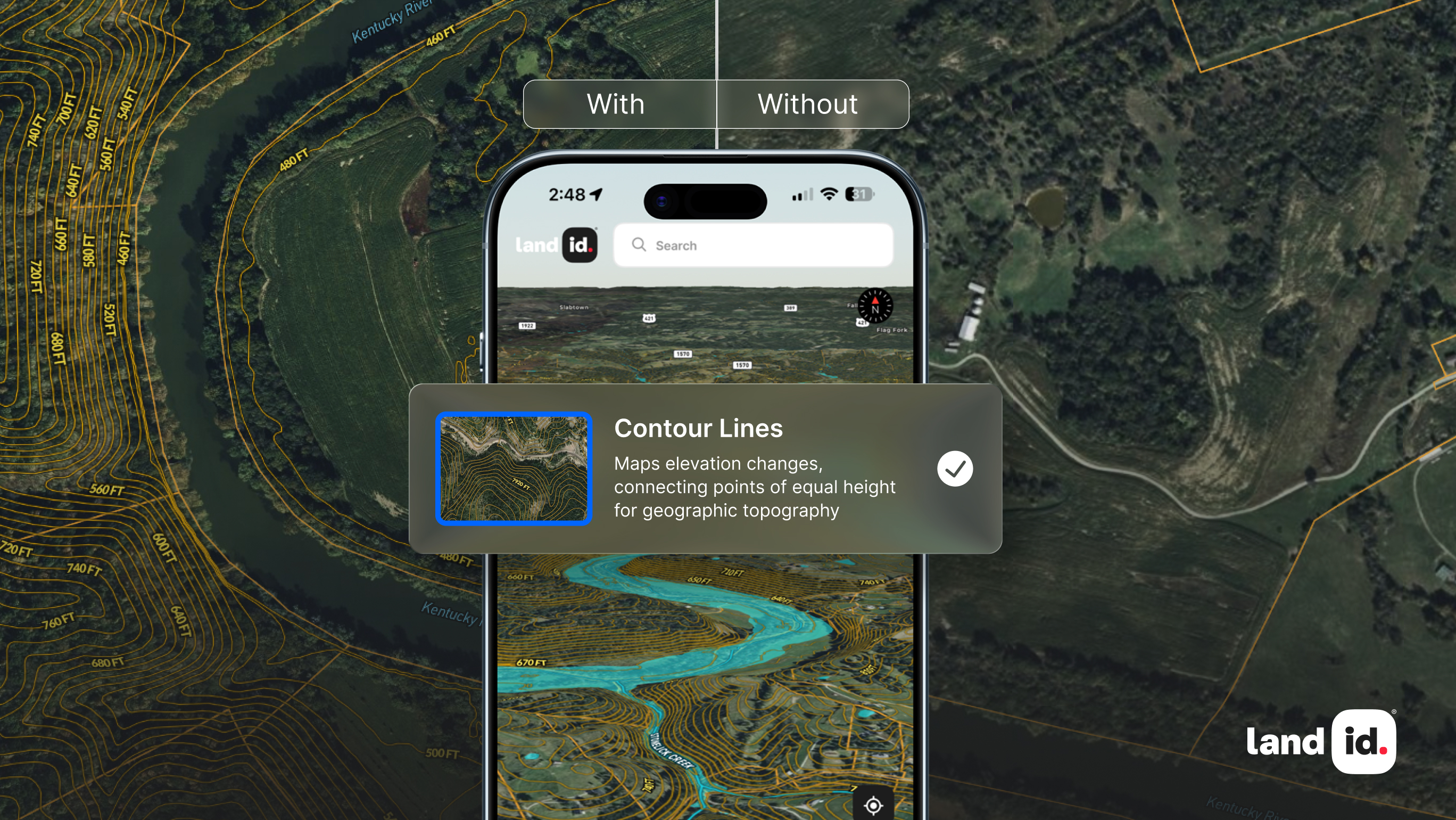Ever wondered who owns that interesting piece of property down the street?
Or maybe you’re eyeing a potential investment and need the scoop on its ownership history?
Figuring out who owns a property doesn't have to be a headache. Sure, property ownership details can seem hidden behind layers of bureaucratic paperwork, but there are some pretty straightforward ways to dig up this info.
In this blog post, we’re going to walk you through five top methods to find out who owns a property. These tips will help you whether you’re making your first real estate investment or just satisfying your curiosity about local lands. We’re keeping it simple and straightforward, so you can follow along easily and get to the bottom of property ownership in no time.
We'll explore traditional options like public records and modern solutions like Land id®, empowering you to find the information you need quickly and efficiently.
Main Takeaways From This Article:
- Traditional methods, such as accessing public records at the county clerk and modern approaches through online county or city websites, are fundamental for obtaining property ownership details.
- While the former may be time-consuming and limited by office hours, online databases offer the convenience of accessing information 24/7 from home, although data timeliness and regional variations in detail can be a challenge.
- Professional land surveyors are invaluable for detailed and legally binding information about property boundaries and ownership. They offer precise measurements and detailed ownership verification, which are crucial for resolving disputes or planning development projects, albeit at a higher cost.
- Land id® simplifies the process of finding property ownership information by providing a user-friendly online platform that delivers instant results and comprehensive data. This service is accessible nationwide and caters to both casual inquiries and detailed professional needs, enhancing efficiency and data comprehensiveness over traditional methods.
How To Find Out Who Owns a Property: Top Five Methods
Here are some tried-and-true methods to help you find out who owns a property.
1. Public Records
Traditionally, property ownership details have been documented in public records housed within local county recorder's offices. These records typically include the property owner's name, address, purchase price, historical ownership information, and legal descriptions, as well as details like square footage and building information. To access these records, you'll often need to visit the county office in person.
Accessing Public Records
- Visit the appropriate county clerk's office or city government office in person.
- Locate the land records department or public access terminal (sometimes called a cadastral).
- Search by property address, legal description, or owner name (if known).
Limitations of Public Records
- Time-consuming: Public records are like buried treasure – valuable, but require some digging! Visiting county offices often means waiting in lines and sifting through mountains of paper. It can be a lengthy process, especially if you're researching multiple properties.
- Limited Accessibility: Just like your schedule, government offices have limited hours, typically closing on weekends and evenings. This can be inconvenient if you work a full-time job or have a busy lifestyle.
Not Always Up-to-Date: While public records are updated, there can be a lag between a property sale and its information being updated in the system. This means you might not be getting the most recent ownership details.
2. Online County or City Websites
Fortunately, the digital age has brought a welcome shift. Many county and city governments have begun offering online access to property ownership information. This significantly improves accessibility, allowing you to search for details related to property owners from the comfort of your own home.
Benefits of Online Records
- Convenience: No more long drives, parking hassles, and waiting lines! Online property records allow you to search for property ownership details from the comfort of your home or office. No more squeezing into crowded government offices – pull up a comfy chair, grab a coffee, and get searching!
- Accessibility: Unlike physical offices with limited hours and days of operation, online records are accessible anytime, day or night. Need to squeeze in a property search late at night after work or during a quick break on the weekend? No problem! Online records have you covered.
Potential Challenges of Online Records
- Region Specific: If you are looking for property data from multiple cities, counties or jurisdictions, you will likely have to use multiple record websites with multiple user interfaces for each type of data you are looking for.
- Regional Inconsistencies: While online records offer convenience, it's important to be aware of the potential for regional inconsistencies. Some counties offer information with user-friendly interfaces, while others might have limited details available or clunky, outdated interfaces that can make searching frustrating.
Data Update Frequency: The timeliness of online records can also be a bit of a concern. While many counties strive for prompt updates, there can be a lag between a property sale and the information reflected online. This means the information you see might not be the absolute latest, so it's always wise to be mindful of potential delays.
3. Real Estate Websites
For those seeking property ownership details beyond the confines of public records, commercial real estate websites offer a compelling alternative. These platforms cater primarily to real estate professionals and investors, providing a wealth of information beyond just who owns the property.
Ownership Details and Beyond
These websites function as comprehensive databases, offering a deeper dive into property specifics. Here's what you can typically expect to find:
- Ownership Details: Current and sometimes historical ownership information is available.
- Property Characteristics: Learn about the property itself, including square footage, building type, zoning information, and even the number of stories.
- Market Insights: Access valuable data such as recent sales prices, current rental rates, and property tax information to help you gauge the property's market value.
A Convenient Option, But Not Without Caveats
While offering a convenient alternative to public records, real estate websites come with their own limitations:
- Accuracy and Timeliness: The accuracy and timeliness of ownership information can vary depending on the platform and how diligently it updates its data.
- Subscription Fees: Accessing detailed property data, including ownership details, often requires a paid subscription, which can be cost-prohibitive for casual users.
- Sell Side Data: Usually these sites contain data that is useful to sell a property, but not always data that is used by the buyer. You will still need to perform due diligence outside of these websites.
If you're involved in real estate transactions or frequently require detailed property information, subscribing to a reputable real estate sales website can be a worthwhile investment. However, alternative methods might be more suitable for searches and performing due diligence, as most listing data is provided to help sell a property, not always to inform the buyer of any issues.
4. Professional Land Surveyors
When the need for property ownership information goes beyond basic details or involves complexities, engaging a professional land surveyor becomes the wisest course of action. These skilled professionals possess the expertise and specialized equipment to provide a comprehensive and highly accurate picture of a property.
When To Call a Land Surveyor
Here are some situations where a land surveyor's expertise is invaluable:
- Boundary Disputes: Facing a disagreement with a neighbor regarding property lines? A surveyor can precisely measure and map the boundaries based on legal documents and historical records.
- Development Projects: Before embarking on any construction or development project, a land survey is crucial. It ensures accurate property lines are established, potential encroachments are identified, and development plans comply with local regulations.
- Complex Ownership History: Properties with a convoluted ownership history or those that have undergone significant alterations might require a surveyor's investigation to untangle the ownership web.
Detailed Information They Provide
Land surveyors go beyond simply identifying the owner. They offer a wealth of detailed ownership and boundary information, including:
- Precise Property Boundaries: Using advanced surveying techniques, they create highly accurate maps that define the legal extent of your property.
- Detailed Ownership Verification: They confirm current ownership based on legal documents and public records, ensuring clarity and peace of mind.
- Historical Ownership Research: For properties with a tangled ownership past, surveyors can delve into historical records to trace ownership lineage and resolve potential discrepancies.
Costs and Benefits of Professional Surveys
While land surveys provide a wealth of information, they come at a cost. On average, they can cost around, or above $500 per survey, but the fees vary depending on the complexity of the project, the size of the property, and the specific services required.
Benefits
Despite the cost, the benefits of a professional land survey often outweigh the expense:
- Peace of Mind: Having clear and accurate property lines documented by a professional surveyor eliminates potential future disputes and ensures your development plans proceed smoothly.
- Increased Value: A land survey can actually increase the value of your property by providing potential buyers with confidence in the property's boundaries and ownership history.
- Legal Protection: A professional survey serves as a legal document that can be used to settle boundary disputes and protect your property rights. If you encounter difficulties during the process, seeking help from a real estate attorney or a title company can be beneficial. Experts can help you do a title search and efficiently understand complicated property deeds and legalities.
Land surveyors offer an invaluable service for complex situations. However, for those seeking a more readily accessible and cost-effective solution, using a platform like Land id® offers a modern approach.
5. Using Land id®'s Search Feature
In our modern world, searching for property ownership information can seem outdated and complicated. But with Land id®, the process is made easy and efficient. This revolutionary tool provides a simple way to find property ownership details in any city, county, or state in the United States.
Land id®: Unveiling Property Details With Ease
Land id® stands apart as a modern and comprehensive solution for property information. Its intuitive search feature empowers you to find the details you need with remarkable ease.
Here's how it works:
- Effortless Search Options: Land id® offers a user-friendly interface with multiple search options. Simply enter the property's address, property ID, or even the owner's name (if known) into the search bar.
- Instant Results: Unlike the time-consuming nature of traditional methods, Land id® delivers results instantly. With a few clicks, you'll have access to property information.
- Comprehensive Data: Land id® provides a comprehensive data set, including:some text
- Current Ownership Details: Access the name and contact information of the current property owner.
- Property Characteristics: Gain valuable insights into the property itself, such as square footage, building type, and zoning information.
- Due diligence data: Check flood plains, nearby power stations and transmission lines, and over 40 more data points to perform due diligence on a property.
Accessing and Utilizing Land id®'s Search Tool
Getting started with Land id® is effortless. Land id® offers a user-friendly experience designed for anyone seeking property ownership details.
Here's how to unlock the power of Land id®:
- User-Friendly Search Bar: Enter the property address, owner name (if known), or property ID number into the search bar.
- Instantaneous Results: Within seconds, Land id® retrieves and displays a wealth of property information.
Benefits of Using Land id®
Land id® offers a multitude of advantages over traditional methods:
- Speed and Efficiency: No more time-consuming visits or sifting through records. Land id® delivers instant results, allowing you to make informed decisions quickly.
- Comprehensive Data: With detailed ownership information, gain valuable insights into the market value of any property.
Nationwide Coverage: Unlike limitations imposed by local jurisdictions, Land id® boasts nationwide coverage. Using a single platform, you can search for properties across all 50 states from the comfort of your home or office computer.
Unlock Property Insights With Land id®
Land id® makes finding property ownership details a breeze. Simply enter an address or owner name and instantly access a wealth of information, all from the comfort of your couch.
Land id® goes beyond just who owns the property. You'll see details like square footage and even aerial imagery. Plus, explore market trends and tax info to make informed decisions.
Here's what Land id® offers:
- Fast & Easy Search: Find property details in seconds; no appointment is needed.
- Comprehensive Data: Get a complete picture of any property with detailed property characteristics for informed decision-making.
- Nationwide Coverage: Search for properties across all 50 states with a single platform.
Stop wasting time and money on outdated methods. Sign up for a free 7-day trial of Land id® today and unlock a world of property insights at your fingertips!
FAQs

Continue Reading





